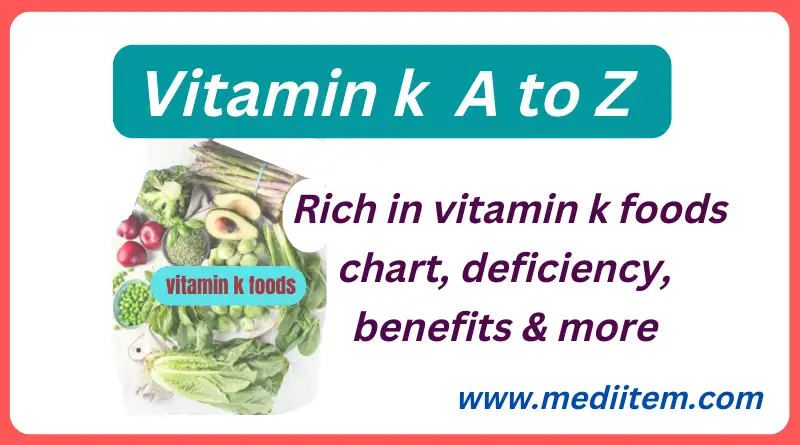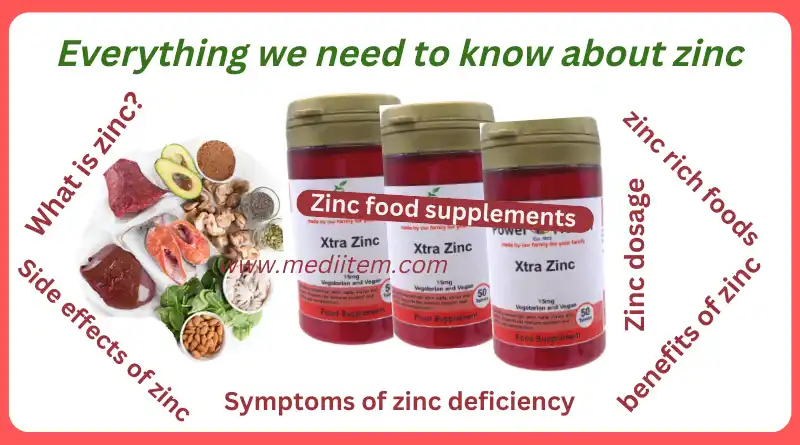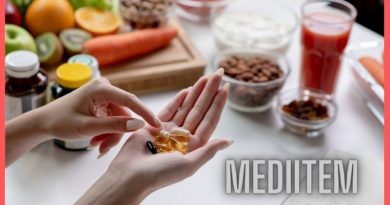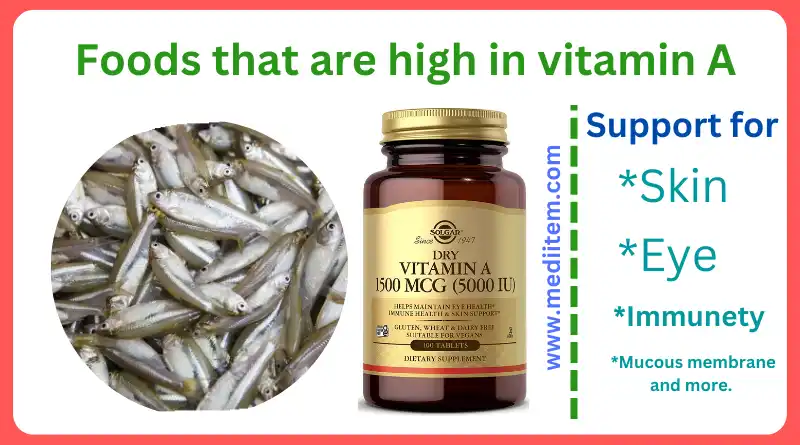Rich in vitamin k foods (A to Z)
Rich in vitamin K foods is one of the most unknown, but it is essential for blood coagulation and bone health. Vitamin K is a fat-soluble vitamin, so your body stores it in fatty tissue and the liver. It is best known for its role in helping blood coagulate or coagulate properly. (k) food plays an important role in bone health.
Classification of vitamin k: Treatment depends on the presence or absence of bleeding, the place where it occurs, and the suspicion of deficiency. There are three forms of vitamin K:
Type of K1 Details-
There are different types of vitamin K and one of them is K1. This vitamin is also known as phylloquinone and is found in plants and plant-based products, such as green leafy vegetables, including spinach, Swiss chard, mustard greens, parsley, and romaine lettuce, among others.
The main symptom of vitamin K1 deficiency: is the tendency to hemorrhage and bruises, as well as blood stains under the fingernails Vitamin K1 is the only form available in the United States and other countries as a supplement. Vita K 5 mg tab is available as part of multivitamin complexes. Vitamin K1 is needed only in small doses, about 90-120 mcg daily, to allow blood to coagulate.
Water-soluble chlorophyll: is the most common form of this supplement found without a prescription. rich in vitamin K foods are available in the form of tablets, caps, and liquids.
Ideas about Vitamin K2 (menaquinone):
is important for the fixation of calcium in bones and also contributes to blood clotting People who do not eat enough vegetables have altered gut microbiota or have inflammatory bowel disease are at higher risk of vitamin K2 deficiency. Among the benefits of vitamin K2 is better bone health. It is also associated with a lower number of cases of cancer, diabetes, and cardiovascular diseases. There is also vitamin K2 or menaquinone, which is produced by bacteria, so it is essential to have healthy bacteria in the microbiota so that they can form it. In food, it can also be found in some fermented foods, although the amounts vary according to the method of production.
Vitamin K2 (menaquinone) also helps activate proteins that play a role in the blood clotting process. It is best for the proper functioning of blood flow. Another interesting point of vitamin K2 is that it contributes to the fixation of calcium in the bones. as it helps to combine the mineral with osteocalcin (a protein present in the bone structure).
In addition to being naturally produced by our intestinal flora, vitamin K2 can also be found in animal and fermented foods – such as meat, milk, cheese, yogurt, and derivatives. Therefore, to maintain the health of the circulatory and bone systems, you must include them in your daily menu.
Vitamin K3 (menadione): is produced in the laboratory and used in dietary supplements. Unlike vitamins K1 and K2, K3 cannot be found in food as it is an artificial substance produced in a laboratory. Generally, it is used by the health industry in the preparation of food supplements and is only indicated for individuals who suffer from vitamin K deficiency. It is worth mentioning, however, that it is necessary to consult a doctor to know if there is a need for nutrient supplementation.
N.P. is most commonly used in livestock and pet feed. Vitamin K3 is less used in dietary supplements for humans.
Rich in vitamin k foods chart
According to Healthline, the nutrient is present in a wide variety of ingredients, but the foods with the highest amount of vitamin K are green leafy vegetables such as –
- Green beans (cooked) = 100 grams: 48 mcg
- Grapes = 100 grams: 15 mcg
- Egg yolk =100 grams: 34 mcg
- Mustard greens (100 grams: 593 mcg)
- Cheddar =100 grams: 13 mcg
- Swiss chard (100 grams: 830 mcg )
- Collard greens (100 grams- 407 mcg)
- Chicken liver = 100 grams: 13 mcg
- Butter =100 grams: 21 mcg
- Avocado = 100 grams: 21 mcg
- Natto (100 grams – 1,103 mcg )
- Broccoli (cooked) 100 grams = 141 mcg
- Beef liver = 100 grm – 106 mcg
- Chicken = 100 grams; 60 mcg
- Pomegranate =100 grams: 16 mcg
- Prunes = 100 grm: 60 mcg
- Kiwi = 100 grams: 40 mcg
- Soybean oil = 100 grams: 184 mcg
- Green peas (cooked) 100 grams: 26 mcg
- Soft cheeses = 100 grams: 59 mcg
- Whole milk = 100 grams: 1.3 mcg
- Cabbage (cooked) = 100 grams: 109 mcg
- Figs =100 grams: 16 mcg
- Spinach (raw) 100 grams = 483 mcg
More items of high vitamin K –
Lettuce, blackberries, blueberries, tomatoes, bacon, pine nuts, soybeans Etc
Rich in vitamin k foods sources –
Rich in vitamin k foods deficiency symptoms
- Severe deficiency of this nutrient can lead to bruising and bleeding problems due to slower blood clotting,
- As a reduced bone strength and increased risk of osteoporosis.
- Its deficiency causes problems such as osteoporosis, bone weakness, and blood problems.
Vitamin k benefits
It is key to maintaining healthy bones and proper blood clotting. This vitamin has a protective effect on the heart, works to keep the skeleton strong, and prevents calcification of the arteries and heart disease. It is also an antioxidant, so it prevents the formation of free radicals and, therefore, prevents premature aging.
Osteoporosis Disease– your body needs vitamin K to use calcium to build bone. People who have higher levels have higher bone density, while lower levels have been found in people with osteoporosis. Similarly, some studies suggest that low levels are associated with an increased risk of osteoarthritis. There is growing evidence that it improves bone health and reduces the risk of bone fractures. One of its primary functions is that it helps in the blood coagulation process. Preventing uncontrolled bleeding.
Rich in vitamin k foods
Causes of vitamin K deficiency
Certain antibiotics, such as cephalosporins, can reduce hepatic gamma-carboxylation of coagulation factors since they inhibit the recycling of vitamin K.Vitamin K competes with it for absorption but is unable to convert coagulation molecules into their active form in the liver.
Lack of supply: deficiency of nutritional type is rare since the needs are very small. Normally, for there to be a deficiency of vitamin K support, other situations usually appear, such as psychiatric conditions, elderly patients, eating disorders, or alcoholism.
Neonatal hemorrhagic disease: it is a condition that appears between two and five days of life and is characterized by ecchymoses, hematomas, mucosal bleeding, and bleeding from the umbilical cord. The most common is in newborns subjected to breastfeeding since the concentration of vitamin K is lower. Other reasons are the limited transport of this vitamin through the placenta and the reduced intestinal flora.
Liver Problems: it is possible that coagulation factors are not synthesized due to alteration of the hepatocyte, which does not metabolize vitamin K.
Treatment of vitamin K deficiency
In the United States, Britain, Canada, and many other countries, all newborns receive vitamin K injections to prevent the possibility of bleeding, particularly in the brain. Babies are born without any bacteria in their intestines and don’t get enough breast milk to sustain them until their bodies can make it. Although a deficiency in newborns is very rare, it is dangerous enough for doctors to give injections.
Newborns most at risk of deficiency are premature or those whose mothers had to take medication for seizures during pregnancy. Mothers taking seizure medication are often given it by mouth for two weeks before delivery. If there is profuse bleeding, which can cause acute anemia or a small hemorrhage that affects vital organs, fresh plasma is administered.
When the bleeding is mild or does not involve vital organs, intravenous vitamin K can be given, with almost complete resolution of the disorder within 6 hours. When there is marked deficiency but no bleeding and normalization of the disorder are required, oral vitamin K is given. In these cases, the administration of 10 mg for 3 days is usually sufficient.
Finally, when an overdose of oral anticoagulants has occurred and it is important to neutralize their effect without reversing anticoagulation, 1 or 2 mg of vitamin K can be administered.
How to take Vitamin K – As with all supplements, check with a doctor before taking vitamin K or giving it to a child.
Warning of rich in vitamin k foods
It also requires caution when taking vitamin E supplements, as vitamin E can interfere with the way vitamin K is processed in the body. People who are receiving dialysis for kidney disease can have harmful effects from too much.
People taking warfarin (Coumadin) should not take it. Antibiotics; especially those known as cephalosporins and more reduce the absorption of vitamin K foods in the body. Antibiotics, especially those known as cephalosporins, reduce the absorption of vitamin K in the body. Using them for more than 10 days can lower vitamin K levels because these drugs kill not only harmful bacteria but also the bacteria that produce vitamin K.
People who already have low vitamin K levels, such as those who are malnourished People who are elderly, or who take warfarin (Coumadin) are at higher risk.
Cephalosporins include – Cefamandole (Mandol), Cefmetazole (Zefazone), Cefotetan (Cefotan), and Cefoperazone (Cefobid). (Dilantin) Phenytoin interferes with the body’s ability to use K vitamins. Taking anticonvulsants (such as phenytoin) while pregnant or breastfeeding can decrease it in newborns.
Warfarin (Coumadin): Blocks the effects of the blood-thinning drug warfarin, so it doesn’t work. You should not take it, or eat foods that contain high amounts, while you are taking warfarin. Talk to your doctor for specific dietary guidelines.
Orlistat (Xenical, All) and Olestra – Orlistat, a drug used for weight loss, and Olestra, a substance added to some foods, reduce the amount of fat the body can absorb.
Because it is a fat-soluble vitamin, these medications can also lower levels. rich in vitamin K foods & Drug Administration now requires that fat-soluble vitamin k and other vitamins- (A, D, E) be added to food items containing olestra.
Doctors who prescribe orlistat generally recommend taking a multivitamin with these vitamins. If you should not take vitamin K, then you should avoid foods that contain olestra.
Cholesterol-lowering medications: Bile acid sequestrants are used to lower cholesterol, reduce the amount of fat your body absorbs, and may also reduce the absorption of fat-soluble vitamins. If you take one of these medications, your doctor may recommend a vitamin K supplement. crosses the placenta rich in vitamin K foods and is also found in breast milk. Pregnant women and women who are breastfeeding should talk to their doctor before taking supplements.
More idea
Read more: Vitamins complete list
New recommended product
1) Vitamin K (Vitamins and Hormones) 1st Edition, Kindle Edition…
2) Solgar Vitamin K2 MK7 100mcg Vegetable…
3) Whole Foods Market, Vitamin K2, 90 Count…
4) Vitamin K, soothes skin and reduces redness, moisturizes skin…
Please subscribe to my channel and follow
YouTube



